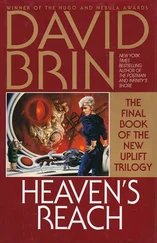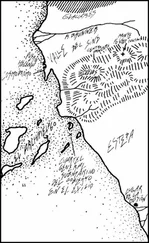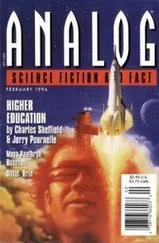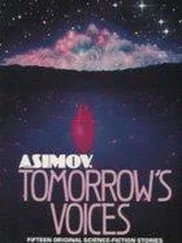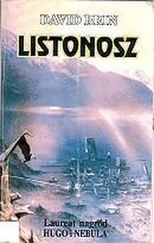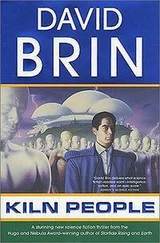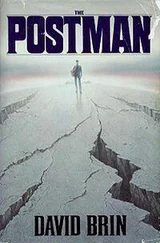Has the Apocalypse vanished, then? Certainly not. It’s no longer the hoary Four Horsemen of our ancestors that threaten us, but new dangers, far worse in the long run. The by-products of human shortsightedness and greed.
Other generations perceived a plethora of swords hanging over their heads. But generally what they feared were shadows, for neither they nor their gods could actually end the world. Fate might reap an individual, or a family, or even a whole nation, but not the entire world. Not then.
We, in the mid-twenty-first century, are the first to look up at a sword we ourselves have forged, and know , with absolute certainty, it is real…
— From
The Transparent Hand,Doubleday Books, edition 4.7 (2035). [D hyper access code 1-tTRAN-777-97-9945-29A.]
“All right, babe. The first elevator heading down will be crammed with cargo, but Glenn Spivey put in a word, so I should be able to hitch a ride on the next one. I may even be in Central before you.” Teresa shook her head, amazed. “Spivey arranged it? Are we talking about the same Colonel Spivey?” Her husband’s face beamed from the telecom screen. “Maybe you don’t know Glenn as I do. Underneath that beryllium exterior, there’s a heart of pure—”
“ — of pure titanium. Yeah, I know that one.” Teresa laughed, glad to share even a weak, tension-melting joke.
So far, so good , she thought. Right now it felt great just looking at him, knowing he was a mere forty kilometers away, and soon would be much closer. Jason, too, sounded eager to give this a try.
Someone had once told Teresa it was too bad about her husband’s smile, which sometimes transformed his intelligent features into those of an awkward puppy dog. But Teresa found his grin endearing. Jason might be insensitive at times — even a jerk — but she was sure he never lied to her. Some faces just weren’t built to carry off a lie.
“By the way, I watched you snag that hook, first pass. Did you take over from the computer again? No machine pilots that smoothly.”
Teresa knew she was blushing. “It looked like the program was stuttering so I…”
“Thought so! Now I’ll have to brag insufferably at mess. It’ll be your fault if I lose all my friends up here.”
The capture maneuver was actually simpler than it looked. Pleiades now hung suspended below the space station, from a cable stretched taut by gravitational tides. When it was time to go, they’d simply release the hook and the shuttle would resume its original ellipse, returning to mother Earth having saved many tons of precious fuel.
“Well, I reckon it’s cause I’m paht Texan,” she drawled, though she was the first in all her lineage ever to see the Lone Star State. “Ergo mah facility with the lasso.”
“It also explains why her eyes are brown,” Mark Randall inserted from nearby.
Jason’s image glanced toward Teresa’s copilot. “I don’t dare comment on that, so I’ll pretend I didn’t hear it.” Then, back to Teresa, “See you soon, Rip. I’ll reserve a room for us at the Hilton.”
“I’ll settle for a broom closet,” she answered, and hang it if Randall took the wrong meaning. Some people just couldn’t imagine that a husband and wife, meeting for the first time in months, might want above all else to make contact, to talk quietly and preserve something neither of them wanted to lose.
“I’ll see what I can arrange. Stempell out.”
After securing the hook, their first task had been to offload tons of liquid hydrogen and oxygen. Likewise the extra orbital maneuvering propellants Teresa’s careful piloting had saved. Every kilo of raw material in orbit was valuable, and the station offloading crew went through the procedures with meticulous care.
The holo display showed Pleiades suspended, nose upward, just below the bottom portion of the station — Nearpoint — the section closest to Earth. It was a maze of pipes and industrial gear hanging by slender, silvery threads many miles into the planet’s gravity well. Teresa watched nervously as three station operators in spacesuits finished draining the aft tanks. Only when the hoses were detached at last did she release a knot of tension. Explosive, corrosive liquids, flowing only meters from her heat shielding, always made her edgy.
“Crew chief requests permission to commence cargo offloading,” Mark told Teresa.
“Granted.”
From the maze above, a giant, articulated manipulator arm approached Pleiades’ cargo bay. A spacesuited figure waved from the bay, guiding the arm gingerly toward the mysterious Air Force package.
Colonel Glenn Spivey observed from the window overlooking the bay. “Easy does it. Come on, you bastards, it’s not made of rubber! If you ding it—”
Fortunately, the crew outside couldn’t hear his backseat driving. And Teresa didn’t mind. After all, he was charged with equipment worth several hundred million dollars. Some anxious muttering at this point was understandable.
So why do I detest the man so much ? she wondered.
For months Spivey had been working closely with her husband on some unspoken project. Perhaps it was her dislike of being excluded, or that nasty word “secrecy.” Or perhaps the resentment came simply from seeing the colonel take up so much of Jason’s attention, at a time when she was already jealous of others.
“Others”… meaning that June Morgan woman, of course. Teresa allowed herself a brief remise of resentment. Just don’t let it cause an argument , she reminded herself. Not this time. Not up here .
She turned away from Spivey and scanned the status boards again — attitude, tether strain, gravity gradient — all appeared nominal.
In addition to the hook-snatch docking trick, tethered complexes like this one offered many other advantages over old-style “Tinkertoy” space stations. Long, metalized tethers could draw power directly from the Earth’s magnetic field, or let you torque against those fields to maneuver without fuel. Also, by yet another quirk of Kepler’s laws, both tips of the bola-like structure experienced faint artificial gravity — about a hundredth of a g — helpful for living quarters and handling liquids.
Teresa appreciated anything that helped make space work. Still, she used remote instruments to examine the braided cables. Superstrong in tension, they were vulnerable to being worn away by microscopic space debris, even meteoroids. Statistical reassurances were less calming than simply checking for herself, so she scanned until she was sure the fibers weren’t on the verge of unraveling.
Overhearing Spivey, clucking like a nervous hen as his cargo cleared the bay, Teresa smiled. I guess maybe we’re not that different in some ways .
The Russians and Chinese had similar facilities in orbit, as did Nihon and the Euros. But the other dozen or so space-capable nations had abandoned their military outposts as costs rose and the skies came increasingly under civil control. Rumor had it Spivey’s folk were trying to cram in as much clandestine work as possible before “secrecy” became as outmoded up here as below.
The crane operator loaded the Colonel’s cargo into an old shuttle tank — now the station freight elevator — and sent it climbing toward the weight-free complex, twenty klicks above.
“Request permission to prepare the airlock for transit, Captain.” Spivey was already halfway down the companion-way to middeck, impatient to join his mysterious machine.
“Mark will help just as soon as the tunnel is pressurized, Colonel.”
One spacesuited astronaut examined the transparent transitway connecting Pleiades’ airlock to Nearpoint. He waved through the rear window, signing “all secure.”
Читать дальше



